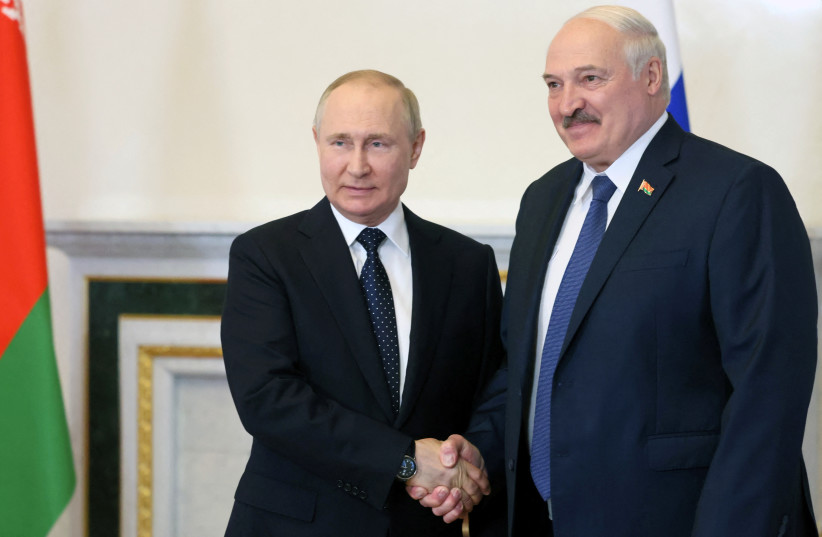Iranian supreme leader calls for cooperation among US-sanctioned states

Experts say sanctions will achieve policy goals even if sanctioned countries decide to cooperate but acknowledge that criticism of sanctions’ effectiveness will continue to grow.
In a meeting with the Belarusian president on Monday, Iranian Supreme Leader Ayatollah Ali Khamenei called on states facing sanctions from the West to unite in order to neutralize the effects of the sanctions.
“The countries that have been sanctioned by the United States must cooperate with each other and form a united front to destroy the weapon of sanctions,” Khamenei said. “We believe that such a thing is achievable.”
In addition to discussing sanctions, Khamenei and Belarusian President Alexander Lukashenko signed seven memorandums of understanding between the two countries.
Khamenei argued that the sanctions imposed on Iran had allowed the country to develop independently. “The severe sanctions made Iran aware of its capabilities and internal strengths," he said. “The sanctions provided the ground for many developments in Iran and our country was able to advance outstandingly in various fields.”
Can Iran find a way around US sanctions?
Until the beginning of the Russian invasion of Ukraine, Iran held the title of the world’s most sanctioned nation. The US has sanctioned Iran since 1979, when 52 American diplomats and citizens were taken hostage by a radical student group. More recent sanctions on Iran have related to the country’s support of terrorism and development of a nuclear program.
Valeria Scuto, principal intelligence analyst covering the Middle East and North Africa at Sibylline, a London-based risk consultancy firm, told The Media Line that Khamenei’s recent comments should be understood as part of a wider foreign policy strategy.
“The developments underscore Iran’s continued pursuit of a nonaligned foreign policy that prioritizes thawing relations with neighboring and non-Western countries,” Scuto said. She noted that Iranian President Ebrahim Raisi had made similar statements in a meeting with Russian President Vladimir Putin in September 2022.
Two days before Khamenei’s comments about Western sanctions, Iran and Saudi Arabia announced that they would resume diplomatic relations according to a deal brokered by China. Scuto described the announcement as signaling Iran’s “further intentions to normalize relations with additional Gulf countries.”
While Scuto acknowledged that the effectiveness of US sanctions has been criticized, she rejected Khamenei’s claim that greater cooperation among sanctioned states would render sanctions totally ineffective. “Targeted and multilateral sanctions have been instrumental in achieving significant US and Western foreign policy goals,” she said.
But Scuto noted that cooperation among US-sanctioned countries will offer critics of sanctions material to argue against sanctions’ effectiveness, Scuto said. “This, in turn, provides Tehran with increased partisan rhetoric and leverage challenging the US’s role and influence across the Middle East and North Africa and vis-à-vis China,” she said.
Ecaterina Maţoi, program director at the Middle East Political and Economic Institute in Bucharest, Romania, told The Media Line that the talks between Iran and Belarus are mostly aimed at reducing the efficacy of US sanctions rather than meeting any needs internal to the two countries.
On a strategic level, “Iran and Belarus do not have many gaps that can be filled by the other,” she said.
Strategic cooperation between Iran and Belarus might require agreements that eliminate the use of the US dollar in trade, Maţoi said.
Maţoi said that she doubts that Iran will develop totally new systems and infrastructure in response to US sanctions the way Russia and China have. What is more likely, she said, is that Iran will deepen its relationships with Russia and China to take advantage of the infrastructure that they have developed.
Even if Russia, China, and Iran were all to cooperate fully, it is unlikely that they could function in complete isolation, Maţoi said. But Khamenei’s comment sends a message, nonetheless. “What Iran's rhetoric underscores,” Maţoi said, “is the realignment and establishment of new contenders seeking to challenge US primacy in a changing multipolar order.”
According to Scuto, cooperation between sanctioned states can take many forms. Often sanctioned countries end up exploiting existing loopholes within the sanctions or expanding their ties with nonsanctioned countries.
Iran already heavily relies on front companies that allow it to trade with states such as Iraq, China, and the UAE, Scuto said.
Jerusalem Post Store
`; document.getElementById("linkPremium").innerHTML = cont; var divWithLink = document.getElementById("premium-link"); if (divWithLink !== null && divWithLink !== 'undefined') { divWithLink.style.border = "solid 1px #cb0f3e"; divWithLink.style.textAlign = "center"; divWithLink.style.marginBottom = "15px"; divWithLink.style.marginTop = "15px"; divWithLink.style.width = "100%"; divWithLink.style.backgroundColor = "#122952"; divWithLink.style.color = "#ffffff"; divWithLink.style.lineHeight = "1.5"; } } (function (v, i) { });

